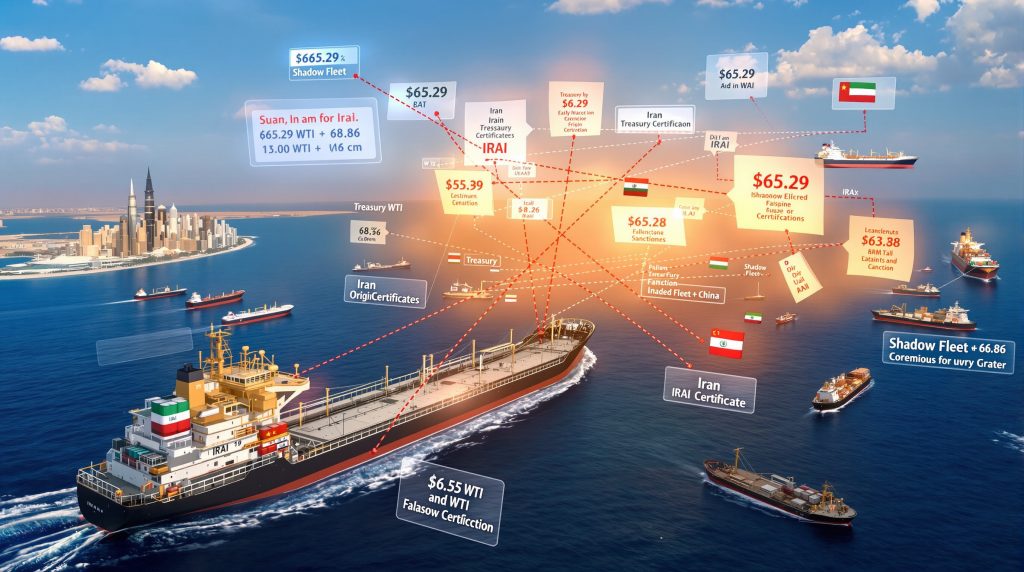What Are the Latest U.S. Sanctions Targeting Iranian Oil?
The United States has intensified enforcement actions against networks facilitating Iranian crude oil exports through sophisticated deception tactics. In August 2025, the Treasury Department unveiled significant sanctions targeting complex smuggling operations designed to circumvent existing restrictions. These measures specifically address schemes where Iranian oil is disguised as Iraqi crude through elaborate blending operations based primarily in the United Arab Emirates.
The sanctions target a network of individuals, vessels, and companies allegedly involved in these evasion tactics, including a prominent businessman with dual Iraqi and St. Kitts & Nevis citizenship, several shipping companies operating throughout the Middle East, multiple vessels identified in the smuggling operations, and financial facilitators processing related transactions.
Key Components of the New Sanctions Package
The latest enforcement package includes designation of specific individuals and entities under Executive Order 13902, freezing of U.S.-based assets belonging to sanctioned parties, prohibition of U.S. persons from engaging in transactions with designated entities, secondary sanctions threats against non-U.S. entities that continue dealing with sanctioned parties, and enhanced monitoring of maritime shipping routes commonly used for sanctions evasion.
According to current market data, WTI Crude is trading at $65.29 per barrel and Brent Crude at $68.86 per barrel, with relatively minimal market reaction to the sanctions announcement. These oil price movements have remained stable despite the new enforcement actions.
How Do Iranian Oil Smuggling Operations Work?
Complex Disguise Techniques
Iranian oil smuggling operations have evolved into sophisticated enterprises employing multiple layers of deception. The recently sanctioned network allegedly engaged in several key tactics:
- Origin Falsification: Blending Iranian crude with Iraqi oil to mask its true source
- Documentation Fraud: Creating falsified certificates of origin claiming Iraqi production
- Shell Company Structures: Using multiple corporate layers to obscure ownership and control
- Maritime Deception: Employing ship-to-ship transfers in international waters to hide the original loading location
The Shadow Fleet Phenomenon
A particularly concerning development in Iranian oil exports has been the emergence of what experts call the "shadow fleet" – vessels specifically acquired to transport sanctioned oil while evading detection. These operations typically involve:
| Shadow Fleet Characteristics | Description |
|---|---|
| Vessel Age | Often older tankers with limited remaining service life |
| Ownership Structure | Complex networks of shell companies in jurisdictions with minimal transparency |
| Insurance Status | Frequently operating without standard protection and indemnity coverage |
| Tracking Compliance | Regular disabling of automatic identification systems (AIS) |
| Flag Registry | Frequent flag changes to jurisdictions with limited oversight |
The Treasury Department specifically targeted several shipping companies and vessel operators for their alleged role in facilitating Iranian oil transportation through this shadow fleet infrastructure. According to recent reports, these tactics have become increasingly sophisticated over time.
Why Are These Sanctions Significant?
Strategic Importance to U.S. Policy
The latest sanctions represent a significant escalation in the U.S. "maximum economic pressure" campaign outlined in National Security Presidential Memorandum 2. This strategy aims to:
- Reduce Iranian oil export revenue to near-zero levels
- Limit funding for Iran's nuclear and ballistic missile programs
- Constrain Iran's ability to finance regional proxy groups
- Pressure the Iranian regime to negotiate on multiple security concerns
Market Implications
Despite these intensified sanctions, oil markets have shown relatively muted reactions. Several factors contribute to this stability:
- Global oil supply remains robust from multiple sources
- Market participants had already factored in ongoing sanctions enforcement
- OPEC production impact continues to exert greater influence on prices
- Strategic petroleum reserves provide a buffer against supply disruptions
Oil prices have remained relatively steady following the announcement, with WTI crude trading near $65.29 per barrel and Brent at approximately $68.86.
How Effective Are Sanctions at Limiting Iranian Oil Exports?
Current Export Volumes
Despite years of sanctions, Iran continues to export significant volumes of crude oil through various evasion techniques. Current estimates suggest:
- Approximately 1.65 million barrels per day in mid-2025
- Nearly 90% of exports directed to Chinese independent refineries
- Iranian crude representing roughly 13.6% of China's total oil imports
- Continued revenue generation despite financial restrictions
Sanctions Effectiveness Challenges
Several structural challenges limit the effectiveness of the sanctions regime:
- Chinese Demand: China's willingness to purchase sanctioned oil at discounted prices provides a reliable market
- Enforcement Limitations: The sheer volume of global maritime trade makes comprehensive monitoring difficult
- Adaptation Capacity: Iranian networks have demonstrated significant ability to evolve tactics as enforcement changes
- International Cooperation Gaps: Not all countries share U.S. policy objectives regarding Iran
What Are the Regional Implications of Continued Sanctions?
Impact on Iraq's Oil Industry
The practice of disguising Iranian crude as Iraqi oil creates significant complications for Iraq's legitimate oil industry:
- Potential reputational damage to Iraqi crude exports
- Compliance challenges for legitimate Iraqi oil traders
- Price pressures from illicit competition
- Diplomatic tensions with the United States and other partners
Gulf Cooperation Council Responses
Gulf states have responded to the sanctions environment by:
- Enhancing monitoring of regional oil movements
- Strengthening compliance procedures at regional trading hubs
- Cooperating with international maritime security initiatives
- Balancing economic interests with security partnerships
The ongoing trade war impact on oil has further complicated regional dynamics, creating additional challenges for Gulf producers.
How Might Sanctions Enforcement Evolve?
Potential Future Enforcement Mechanisms
Experts and policy analysts have suggested several approaches to strengthen sanctions enforcement:
- Expanded Targeting Scope: Extending sanctions to executives and decision-makers behind corporate entities
- Enhanced Maritime Monitoring: Deploying advanced technologies to track vessel movements and detect suspicious activity
- Diplomatic Pressure: Engaging with countries that continue to purchase Iranian oil
- Financial System Leverage: Further restricting access to international banking for entities involved in sanctions evasion
- Military Deterrence: Maintaining naval presence in key shipping lanes to discourage sanctions violations
Policy Debates and Critiques
The effectiveness and appropriateness of the sanctions approach continues to generate significant debate among policymakers and experts:
Arguments Supporting Sanctions:
- Limits resources available for destabilizing regional activities
- Provides leverage for potential diplomatic negotiations
- Demonstrates consequences for violations of international norms
- Creates costs for the Iranian regime's policy choices
Arguments Questioning Sanctions:
- May strengthen hardliners within Iran's political system
- Creates humanitarian impacts on ordinary Iranians
- Has not fundamentally changed Iran's regional behavior
- Pushes Iran toward deeper economic ties with China and Russia
Recent US policy on PDVSA changes have shown how sanctions approaches can evolve over time, potentially providing a model for future Iran policy adjustments.
How Are Sanctioned Networks Adapting?
Evolving Evasion Tactics
As sanctions enforcement intensifies, smuggling networks continue to develop new approaches:
- Technological Countermeasures: Using sophisticated methods to manipulate vessel tracking systems
- Alternative Payment Mechanisms: Employing cryptocurrency and barter arrangements to avoid financial monitoring
- New Transit Routes: Developing longer but less monitored shipping paths
- Expanding Partner Networks: Building relationships with more diverse intermediaries across multiple jurisdictions
Case Study: The Iraqi Blending Scheme
The recently sanctioned operation involving Iraqi oil blending demonstrates the complexity of modern sanctions evasion:
- Iranian crude transported to facilities in the UAE
- Blending with Iraqi-origin oil to create mixed-source product
- Documentation created showing Iraqi origin
- Product sold to international buyers as sanctions-compliant oil
- Proceeds routed through multiple financial intermediaries
- Funds eventually reaching Iranian entities through indirect channels
According to official statements, these schemes have grown increasingly sophisticated in recent years.
What Are the Global Economic Implications?
Oil Market Dynamics
The ongoing cat-and-mouse game between sanctions enforcers and evaders creates several market effects:
- Price discounts for sanctioned oil creating competitive advantages for buyers
- Risk premiums for legitimate traders operating in regions with high sanctions risk
- Compliance costs for financial institutions and shipping companies
- Insurance challenges for vessels operating in high-risk regions
Supply Chain Considerations
The sanctions environment also influences broader energy supply chain decisions:
- Refiners adjusting procurement strategies to manage compliance risks
- Shipping companies implementing enhanced due diligence procedures
- Banks developing more sophisticated transaction monitoring systems
- Energy traders establishing robust know-your-customer protocols
Many analysts have noted that ongoing oil price stagnation may be partially attributed to the market's adjustment to these sanctions dynamics.
What Should Stakeholders Monitor Going Forward?
Key Indicators to Watch
For those tracking the effectiveness and impact of sanctions on Iranian crude:
- Export Volume Trends: Changes in estimated Iranian export levels
- Price Discounts: The differential between Iranian crude and benchmark prices
- Enforcement Actions: Frequency and targets of new sanctions designations
- Diplomatic Developments: Potential negotiations or escalations between the U.S. and Iran
- Regional Security Incidents: Maritime security events potentially linked to sanctions tensions
Potential Diplomatic Scenarios
Several potential diplomatic pathways could influence the sanctions landscape:
- Status Quo Continuation: Ongoing sanctions enforcement with gradual adaptation by both sides
- Negotiated Adjustment: Potential diplomatic engagement leading to modified sanctions framework
- Escalation Pathway: Intensified enforcement leading to heightened regional tensions
- Multilateral Approach: Broader international coordination on Iran policy
FAQ: U.S. Sanctions on Iranian Crude
What legal authority underpins these sanctions?
The sanctions are primarily implemented under Executive Order 13902, which targets the Iranian construction, mining, manufacturing, and textile sectors, along with anyone operating in or transacting with these sectors. Additional authorities include the Comprehensive Iran Sanctions, Accountability, and Divestment Act and various terrorism-related executive orders.
How do these sanctions affect global oil prices?
While significant in policy terms, these specific sanctions have had minimal direct impact on global oil prices, which remain more influenced by broader supply-demand fundamentals, OPEC+ decisions, and macroeconomic factors. The market has largely priced in the ongoing sanctions regime against Iranian exports.
Are these sanctions coordinated with international partners?
The latest sanctions were unilaterally implemented by the United States, though the U.S. continues to engage with allies and partners on Iran policy more broadly. The effectiveness of sanctions is enhanced when multiple countries adopt similar restrictions, but international consensus on Iran policy has fluctuated over time.
How do these sanctions affect legitimate oil traders?
Legitimate oil traders face increased compliance burdens, including enhanced due diligence requirements, transaction monitoring, and documentation verification to ensure they don't inadvertently handle sanctioned oil. This creates additional operational costs and legal risks for companies operating in regions where sanctioned oil might be present.
What happens to companies that violate these sanctions?
Entities found violating U.S. sanctions can face severe penalties, including:
- Designation on sanctions lists, blocking access to the U.S. financial system
- Civil penalties reaching millions of dollars
- Criminal prosecution of individuals involved in willful violations
- Loss of access to U.S. markets and business opportunities
- Reputational damage affecting relationships with other business partners
Conclusion: The Future of Iranian Oil Sanctions
The latest U.S. sanctions targeting Iranian crude smuggling networks highlight the ongoing challenges in implementing effective economic pressure campaigns in the complex global energy market. While sanctions have created significant obstacles for Iranian oil exports, they have not succeeded in reducing them to zero, with substantial volumes continuing to reach international markets through various evasion techniques.
The effectiveness of sanctions ultimately depends on multiple factors: the commitment to enforcement, international cooperation, adaptability to evolving evasion tactics, and the economic incentives for potential buyers. As sanctions continue to evolve, both enforcement mechanisms and evasion techniques will likely grow increasingly sophisticated, creating a dynamic environment that stakeholders across the energy sector must navigate carefully.
For policymakers, the challenge remains balancing sanctions enforcement with broader strategic objectives, including regional stability, energy market functioning, and diplomatic engagement possibilities. For market participants, sanctions compliance will continue to require vigilance, adaptability, and robust risk management frameworks.
Disclaimer: This analysis discusses ongoing geopolitical and regulatory issues that may evolve rapidly. The information presented is based on current understanding as of August 2025 and should not be considered investment advice. Readers should consult with qualified professionals regarding specific compliance requirements related to sanctions regimes.
Want to Catch the Next Major Mining Breakthrough Before the Market Does?
Discovery Alert's proprietary Discovery IQ model instantly identifies significant ASX mineral discoveries, giving you actionable investment insights ahead of the wider market. Explore how historic discoveries have generated substantial returns by visiting the Discovery Alert discoveries page and begin your 30-day free trial today.




